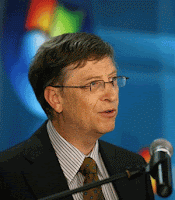But the intriguing question, who is really the 1%? And why do they become the 1%?
According to Forbes published in 2011, the richest man in America is Bill Gates, the co-founder of Microsoft. Its product overwhelms the world and almost nothing to do with Wall Street’s bad image. In the next list names Larry Ellison of Oracle as no. 3, while Jeff Bezos, Mark Zuckerberg, Sergey Brin/Larry Page, Michael Dell and Bill Palmer as no. 13, 14, 15, 18, and 19, respectively. The list shows the 1% is dominated by dotcom billionaires.
They are separated from the list. They represent the materialization of American dream. They manage to create high value-added products which in return give the most profit. All of them are rich in young age merely because of their talents. No hanky-panky, no manipulation, no corruption are the features of these billionaires’ businesses. They are by no means the ones who to blame for the increasingly inequality.
Nor should the Wall Street, let alone capitalism, take ALL responsibilities for American inequality. Instead, there are at least 2 (two) driving forces leading to greater chasm in society, namely: (i) thriving scalable profession and knowledge-based economy and (ii) globalization.
First, being super rich is the upside of scalable career. It is Nassim Nicholas Taleb, the author of best-selling book, Black Swan, coined scalable and non-scalable profession. Writer, singer, dot.com entrepreneur are scalable profession, while doctor, employee, barber are non-scalable profession. The output of the scalable work is unpredictable, because it can be repeated infinite times. As a result, a successful scalable profession will be very rich. Conversely, non-scalable career is relatively stagnant in term of incomes.
Information technology revolution was born in America. Many American youths begin the startups. Some of them flop, but some do so well. The successful startups become so profitable because they can sell the products in the bigger market – this means scalability – and the products are the most value-added – this means knowledge-based economy. Accordingly scalable profession added with high value-added product is the best combination to become the richest and Bill Gates is the poster child.
Second, as suggested by Robert H Frank and Philip J Crook, American economists, in their book, that the world sees ‘The Winner-Take-All Society’. It puts forward that competition results in the absolute winner. And customers prefer to buy products from the winner. The loser’s product will be sidelined and eventually vanished. And in globalization era customers come not only from America, but from everywhere, from Russia to Australia, from Jamaica to Indonesia. This pumps up the volume of sales. As consequence, the winner gets the biggest market share and become super rich.
It brings us back to American inequality.
America has been seeing the 3-decade widening inequality coinciding with the era of spawning dotcom companies and spreading globalization. Given the above account, this inequality is ironically byproduct of America’s success in growing dotcom companies, one of scalable profession and knowledge economy which unfortunately need fewer workers. And this success is exacerbated by the winner-take-all effect that operates globally.
The Wall Street protesters must realize these and should not bark on the wrong tree.
* * * * *

No comments:
Post a Comment